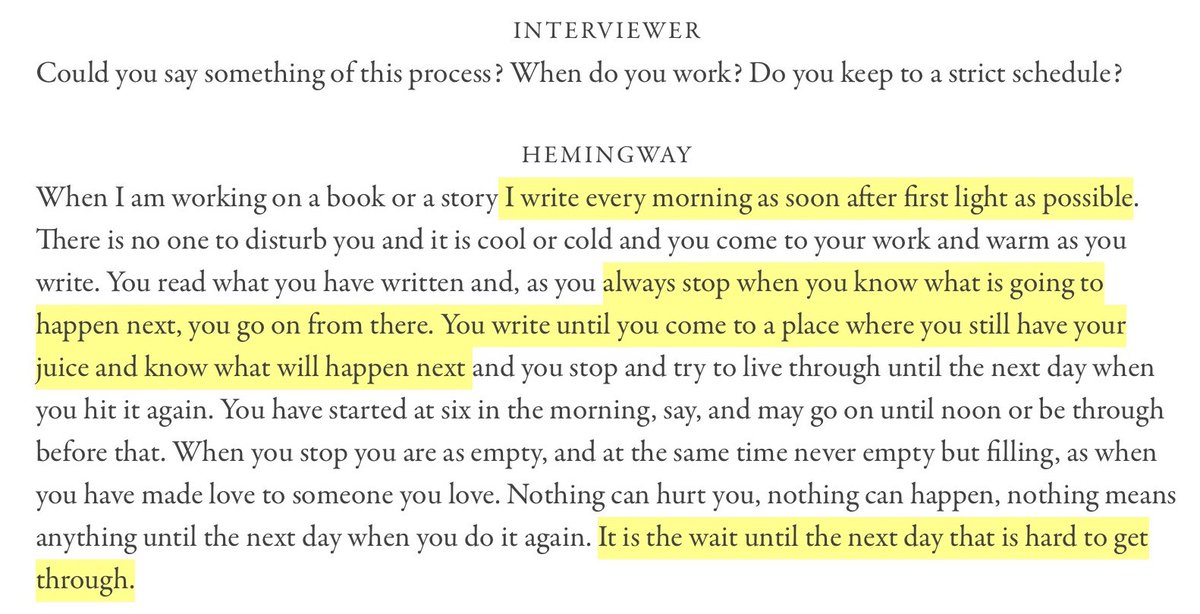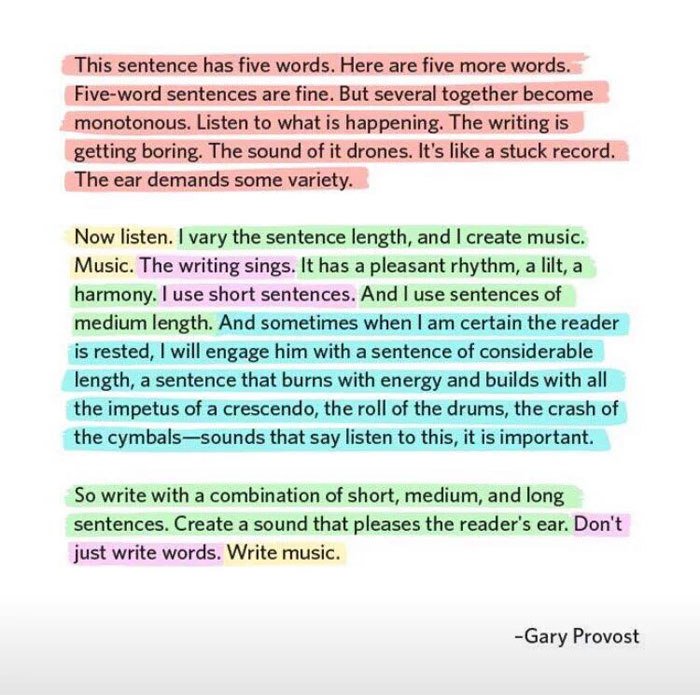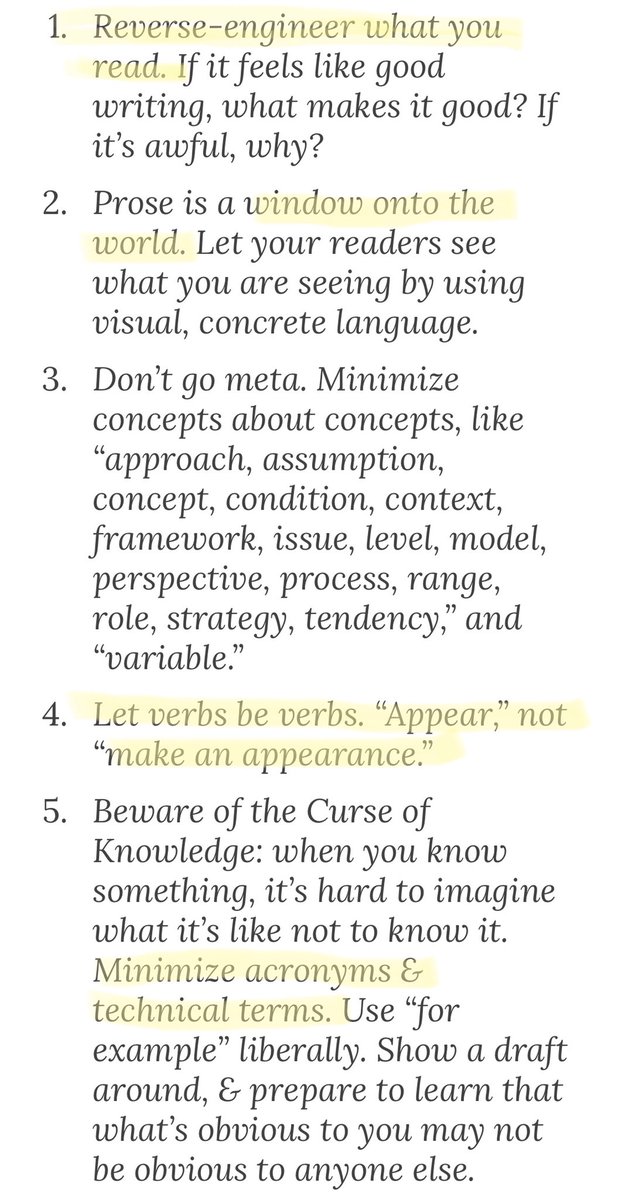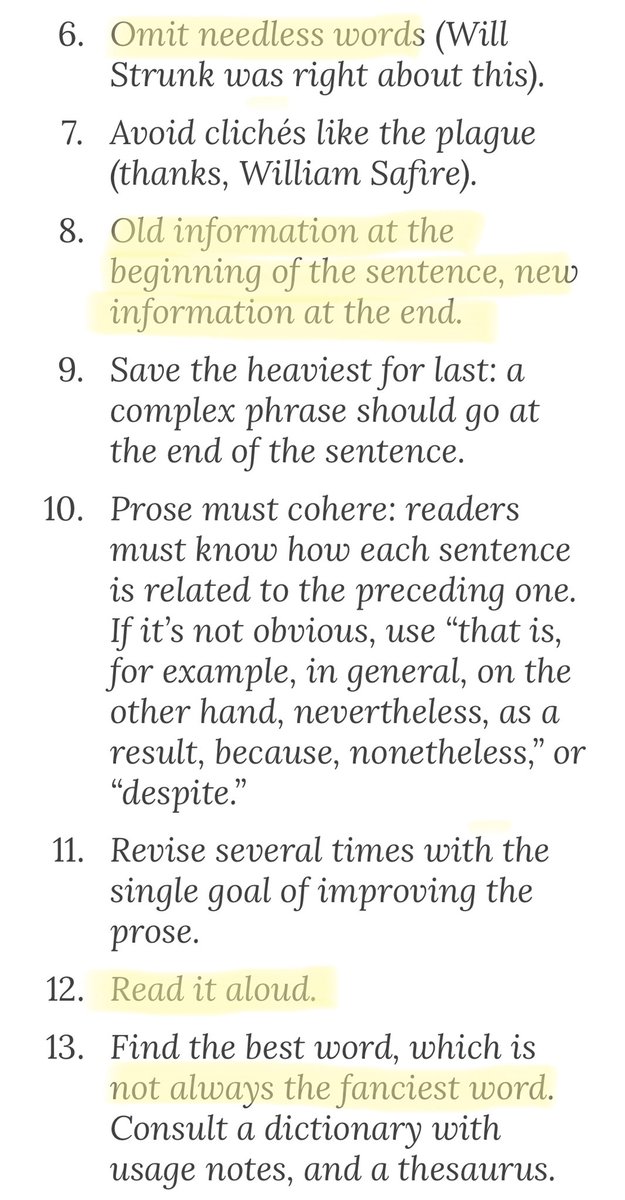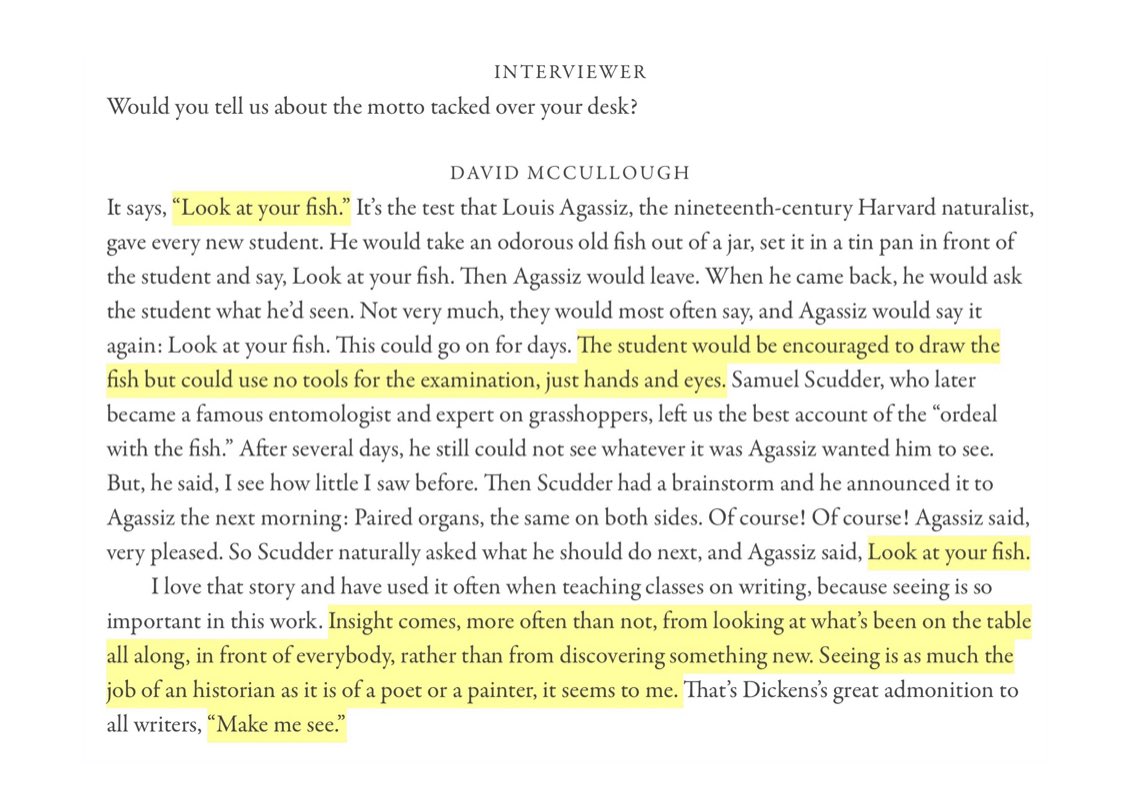
A simple formula for writing hooks: "Get 3 yes's in 30 seconds".
Readers should nod their head yes to the headline, subheading, and first sentence.
If they've made it to the third sentence, they're ready for an interesting and compelling story.
💯
Readers should nod their head yes to the headline, subheading, and first sentence.
If they've made it to the third sentence, they're ready for an interesting and compelling story.
💯
Love this book.
Takeaways:
1) Selling a cure is a lot easier than selling a preventative.
2) Never sell a product or service. Always sell a concept.
3) When editing, refine your copy to say exactly what you want to say with the fewest possible words.
amazon.com/Advertising-Se…
Takeaways:
1) Selling a cure is a lot easier than selling a preventative.
2) Never sell a product or service. Always sell a concept.
3) When editing, refine your copy to say exactly what you want to say with the fewest possible words.
amazon.com/Advertising-Se…
The best non-fiction writers borrow the techniques of fiction.
They make the reader forget they're seeing words on paper.
“Good writing is supposed to evoke sensation in the reader, not the fact that it’s raining, but the feeling of being rained upon.” - Sol Stein
✍️
They make the reader forget they're seeing words on paper.
“Good writing is supposed to evoke sensation in the reader, not the fact that it’s raining, but the feeling of being rained upon.” - Sol Stein
✍️
A lesson from @michaelpollan:
Writing is a form of music.
Like music, great writing has great rhythm.
The best way is to develop great rhythm is to read great writing before bed.
You do a lot of creative work when you sleep and you want to be in a "rhythm of good prose."
🎶
Writing is a form of music.
Like music, great writing has great rhythm.
The best way is to develop great rhythm is to read great writing before bed.
You do a lot of creative work when you sleep and you want to be in a "rhythm of good prose."
🎶
Great writers unlock the ELECTRICITY of sight.
They give their readers a pair of Magic Binoculars.
"Facts alone aren’t enough. They’re too black-and-white. Readers yearn for stories, images, and anecdotes that make the information POP."
👀
perell.com/blog/robert-ca…
They give their readers a pair of Magic Binoculars.
"Facts alone aren’t enough. They’re too black-and-white. Readers yearn for stories, images, and anecdotes that make the information POP."
👀
perell.com/blog/robert-ca…
When you become a regular writer, you change how you live.
Writing forces you to pay attention.
It takes you to a higher level of perception and makes the world pop.
✍️
perell.com/blog/writing
Writing forces you to pay attention.
It takes you to a higher level of perception and makes the world pop.
✍️
perell.com/blog/writing
Style matters.
Nobody has to read what you write, so give people a reason to spend time with you.
"You have to have a HOOK at the beginning and a ZINGER at the end."
- @paulkrugman
💯
Nobody has to read what you write, so give people a reason to spend time with you.
"You have to have a HOOK at the beginning and a ZINGER at the end."
- @paulkrugman
💯
Built a daily writing practice.
Days spent not writing are the enemy of productivity.
“Write every single day. Make it a routine. Even if it’s a small amount, I assure you if you write every day it will pile up and you’ll get things done.” - @tylercowen
Days spent not writing are the enemy of productivity.
“Write every single day. Make it a routine. Even if it’s a small amount, I assure you if you write every day it will pile up and you’ll get things done.” - @tylercowen
Simple copy editing tip:
"In your last pass, change the font to something unfamiliar. Then change the font size. When you're familiar with a piece, your eyes gulp whole passages and miss typos. New fonts focus your eyes on each letter."
- @DKThomp
"In your last pass, change the font to something unfamiliar. Then change the font size. When you're familiar with a piece, your eyes gulp whole passages and miss typos. New fonts focus your eyes on each letter."
- @DKThomp
@DKThomp Writing tips from @jasonzweigwsj:
1. Every tweet, text and email is a chance to improve your writing.
2. Writing is like peeling the layers of your own ignorance. Write to learn.
3. When you find a writer you like, read everything they’ve ever written.
jasonzweig.com/on-writing-bet…
1. Every tweet, text and email is a chance to improve your writing.
2. Writing is like peeling the layers of your own ignorance. Write to learn.
3. When you find a writer you like, read everything they’ve ever written.
jasonzweig.com/on-writing-bet…
Writing falls into 3 buckets:
1. Trivial things that everybody knows.
2. Things that everybody knows, but you have a unique perspective on.
3. Stuff that nobody knows so you have to do tons of research.
Pro-tip: When writing, focus on #2.
Killer insight from @devonzuegel.
1. Trivial things that everybody knows.
2. Things that everybody knows, but you have a unique perspective on.
3. Stuff that nobody knows so you have to do tons of research.
Pro-tip: When writing, focus on #2.
Killer insight from @devonzuegel.
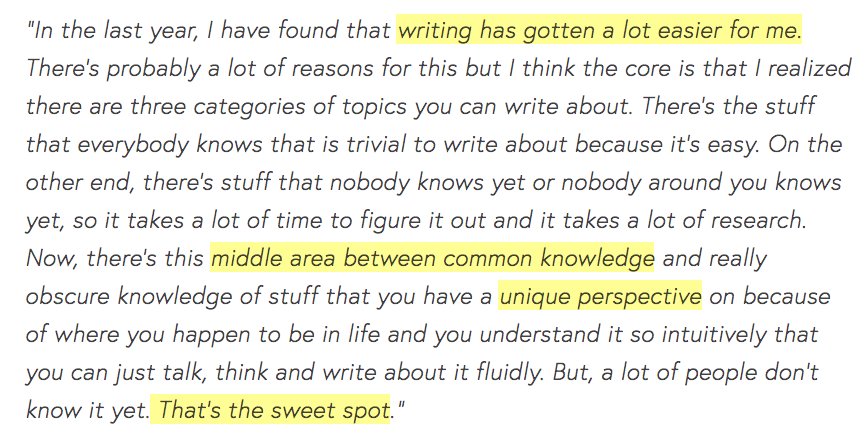
Few exercises help clarify your thoughts better than writing.
Transferring vague feelings into words leads to clarity and surprising insights.
"You’ll be amazed at how much you can learn by writing things down, even if no one but you reads them."
- @MorganHousel
Transferring vague feelings into words leads to clarity and surprising insights.
"You’ll be amazed at how much you can learn by writing things down, even if no one but you reads them."
- @MorganHousel
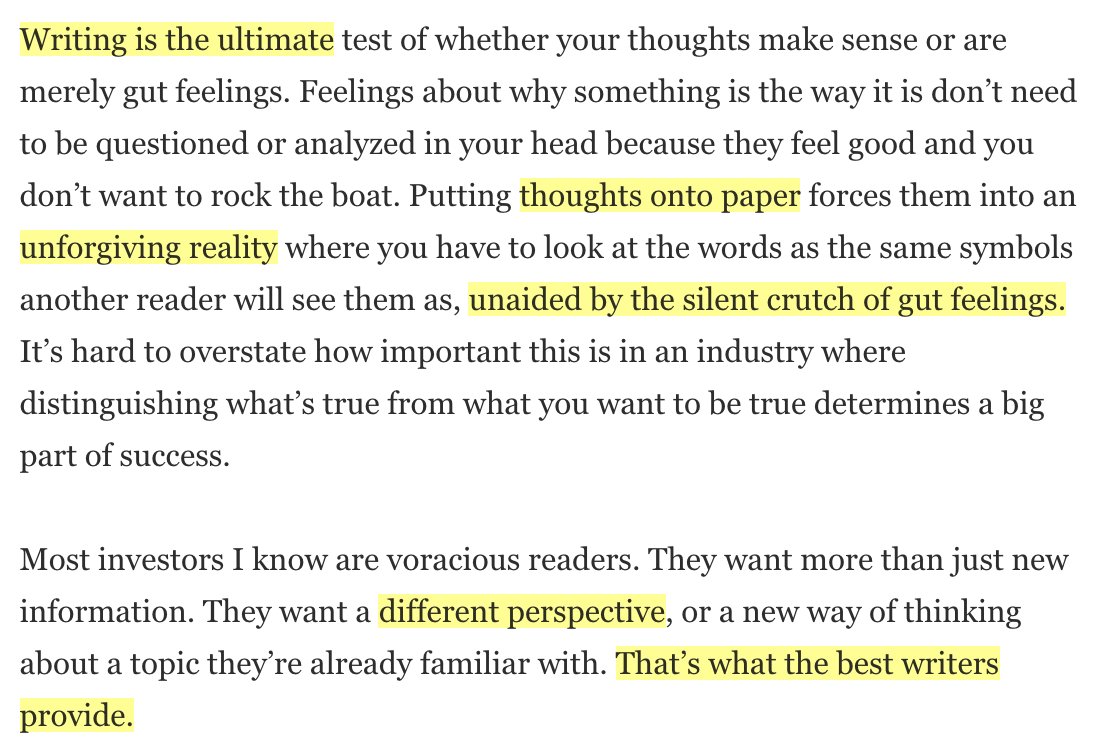
At its best, writing is indistinguishable from MUSIC.
“Great writers orchestrate an interplay between tension, suspense, surprise, release, and completion.
It’s wild and sensual, deliberate and controlled, all at once, all carried out with lightness and grace.” - @jasonzweigwsj
“Great writers orchestrate an interplay between tension, suspense, surprise, release, and completion.
It’s wild and sensual, deliberate and controlled, all at once, all carried out with lightness and grace.” - @jasonzweigwsj
@jasonzweigwsj Writing tips from @ScottAdamsSays:
1. Write short sentences.
2. Avoid putting multiple ideas into one sentence.
3. Business writing is about clarity and persuasion.
4. Prune your sentences. Avoid unnecessary words.
5. Your first sentence needs to grab the reader.
💯
1. Write short sentences.
2. Avoid putting multiple ideas into one sentence.
3. Business writing is about clarity and persuasion.
4. Prune your sentences. Avoid unnecessary words.
5. Your first sentence needs to grab the reader.
💯
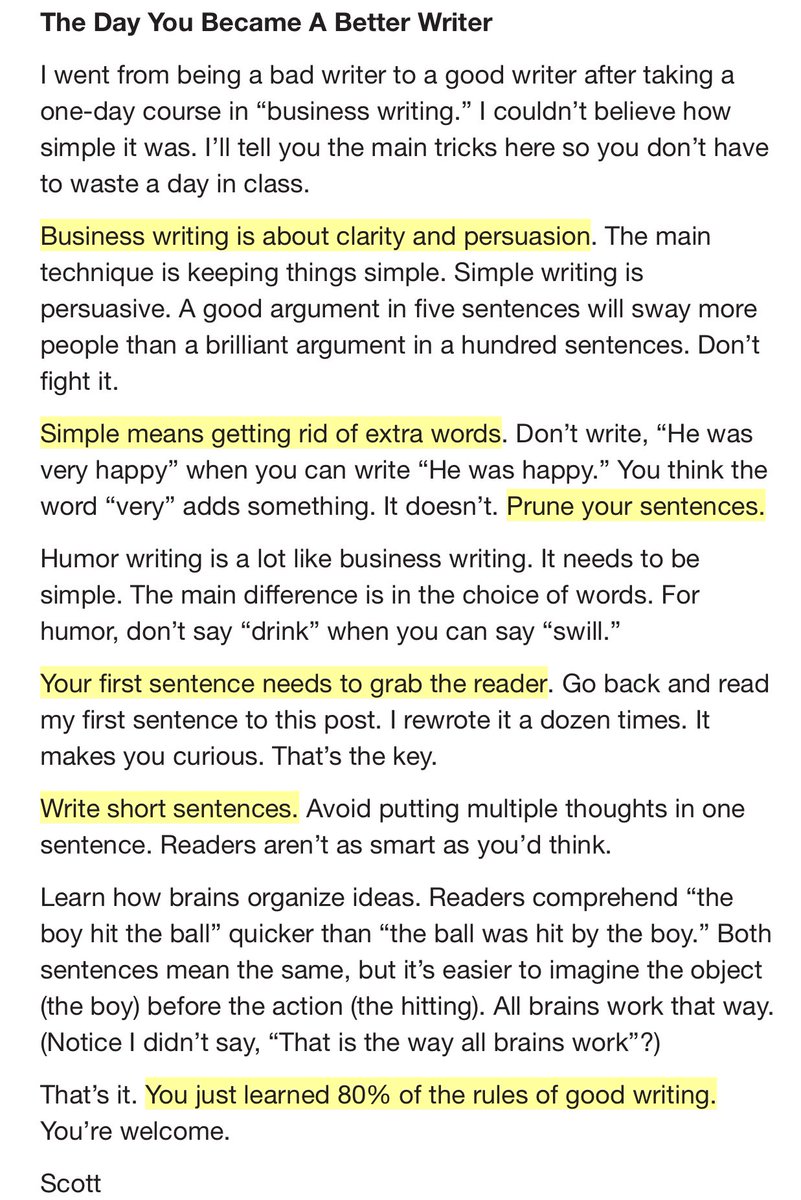
Leave out the parts readers tend to skip.
Poor communicators ramble. Good communicators leave out unnecessary details. Great communicators treat words as the scarcest commodity.
(h/t @morganhousel)
Poor communicators ramble. Good communicators leave out unnecessary details. Great communicators treat words as the scarcest commodity.
(h/t @morganhousel)
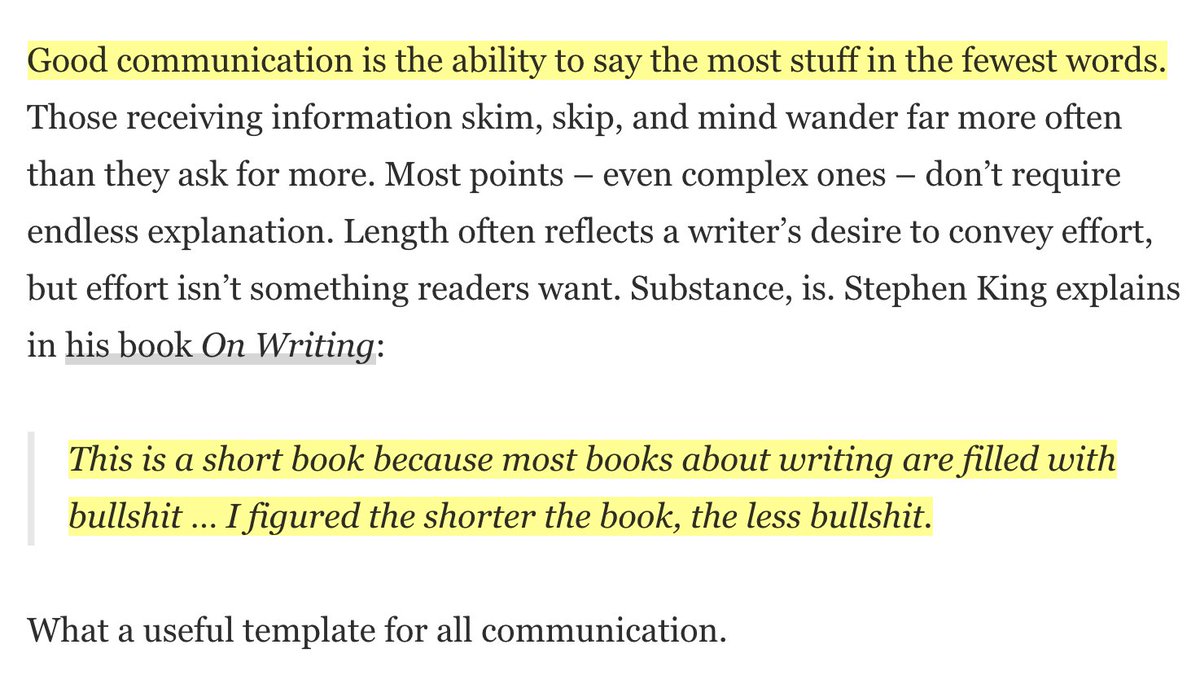
Great writing has rhythm.
It's like a dance, and words are the music that create the atmosphere.
The easiest way to add rhythm to your writing is to vary sentence length. Short sentences speed things up, and long sentences slooooooowwwwww things down.
perell.com/blog/the-ultim…
It's like a dance, and words are the music that create the atmosphere.
The easiest way to add rhythm to your writing is to vary sentence length. Short sentences speed things up, and long sentences slooooooowwwwww things down.
perell.com/blog/the-ultim…
"Entrepreneurs are the best business writers in the world. If you can’t write, you can’t raise money. Or recruit. Or sell.
I don’t know a single great entrepreneur who isn’t a great writer."
- @nivi
venturehacks.com/articles/writi…
I don’t know a single great entrepreneur who isn’t a great writer."
- @nivi
venturehacks.com/articles/writi…
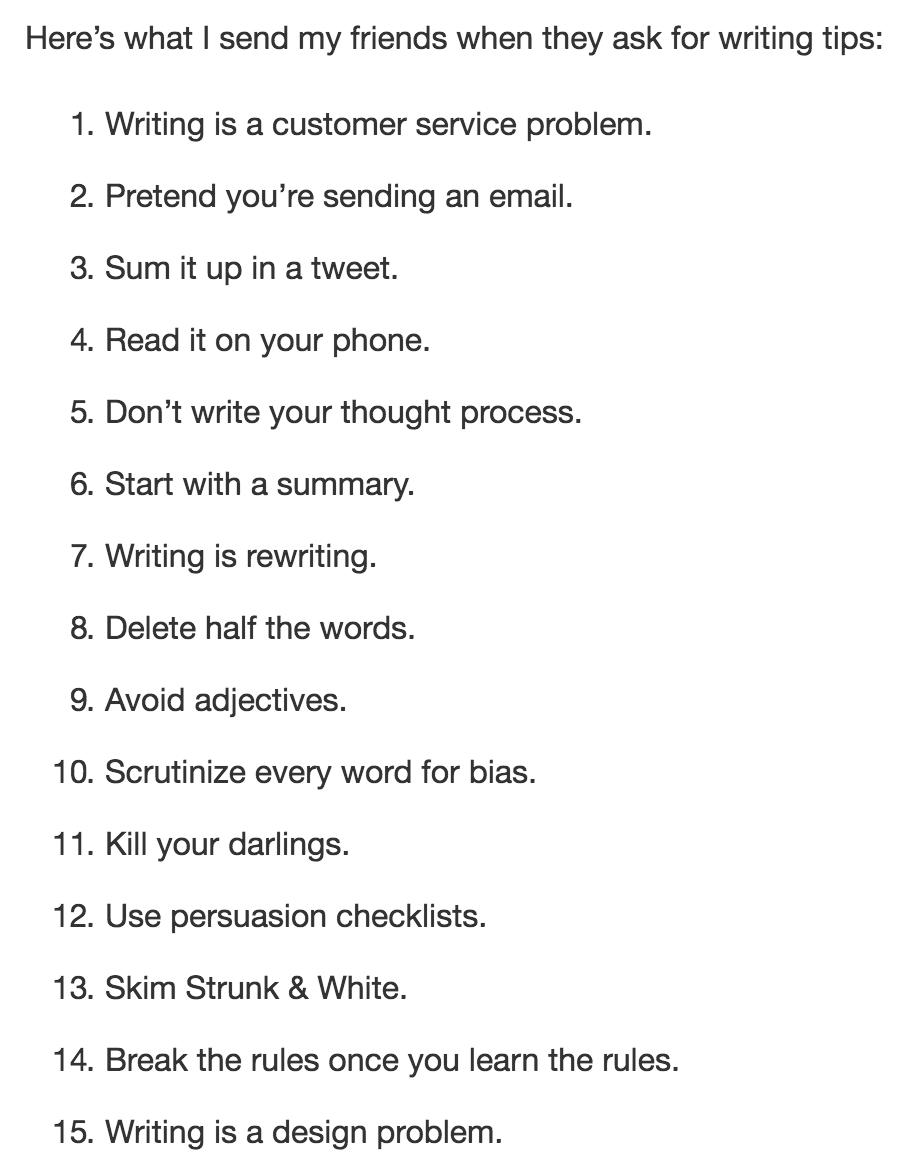
"Writing is attention to detail.
It's that one detail, that one scrap of dialogue, one color or smell that brings the whole scene to life."
It's that one detail, that one scrap of dialogue, one color or smell that brings the whole scene to life."

• • •
Missing some Tweet in this thread? You can try to
force a refresh

